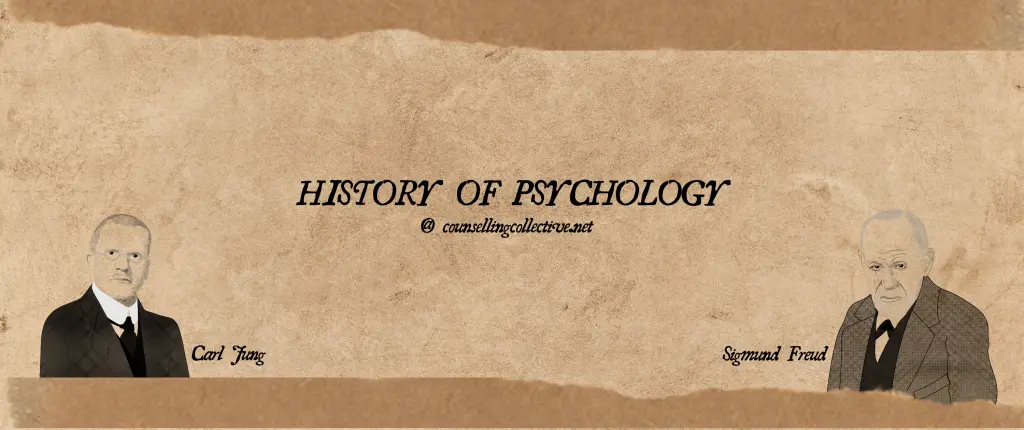
Psychology, is the scientific study of behavior and mental processes. It encompasses a vast range of topics, from understanding the intricacies of cognitive functions to exploring the dynamics of social interactions. Through empirical research and theoretical frameworks, psychology seeks to decipher the underlying principles that govern human thought and action.
This article embarks on a journey through time, tracing the roots of psychology to ancient civilizations, philosophical inquiries, and the pivotal figures who laid the foundation for the modern understanding of the human psyche.[1]
Contents
- 1 Ancient Roots in history of psychology
- 2 Timeline of Psychological Developments
- 3 Development of Modern Psychology
- 4 Key Figures and Their Contributions to the History of Psychology
- 5 Timeline of Famous Psychologists:
- 6 Expansion and Diversification of Psychology
- 7 Contributions of Psychology in Applied Settings
- 8 Recent Trends and Future Directions
- 9 Conclusion
- 10 References:
Ancient Roots in history of psychology
The ancient roots of psychology can be traced back to civilizations such as ancient Egypt, Greece, and China, where philosophers and scholars contemplated questions about the human mind and behavior. Greek philosophers like Socrates, Plato, and Aristotle laid the groundwork for understanding the psyche, while ancient Chinese texts explored topics related to human nature and emotions. These early inquiries set the stage for the development of psychology as a formal discipline in later centuries.
In this section we will discuss about ;
- Early philosophical influences
- Contributions from ancient civilizations
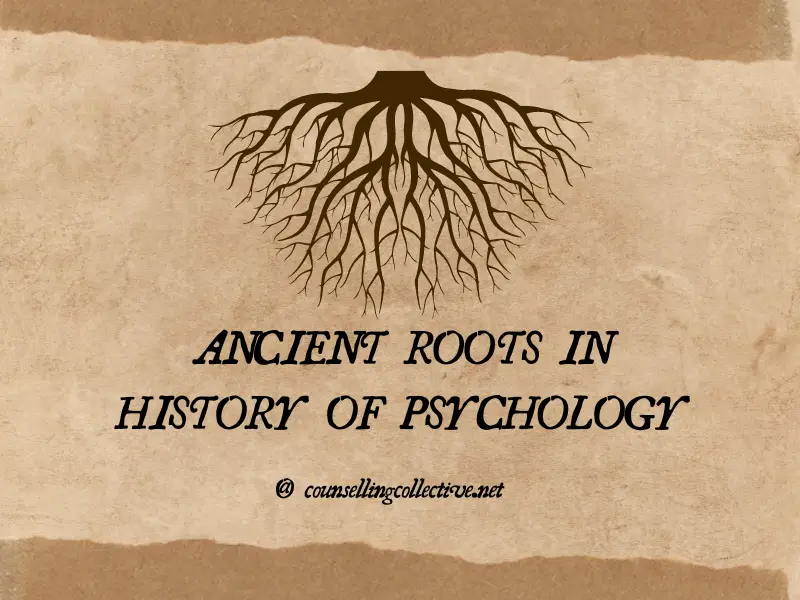
Early Philosophical Influences
The origins of psychological inquiry can be traced back to the philosophical ponderings of ancient thinkers. Greek philosophers, such as Plato and Aristotle, contemplated questions concerning the nature of the mind, the soul, and the essence of human consciousness.
These early musings laid the groundwork for the systematic study of the human psyche.
Contributions from Ancient Civilizations in history of psychology
Ancient Egypt and Mesopotamia
- In the history of psychology, the cradle of civilization, the ancient Egyptians and Mesopotamians demonstrated an early fascination with the human mind and behavior.
- Ancient Egyptian texts reveal insights into dream interpretation, emotional experiences, and mental disorders.
- Mesopotamian cuneiform tablets contain references to psychological phenomena, highlighting the enduring human interest in understanding the workings of the mind. [2][3]
Ancient Greece and Rome
- The philosophical traditions of ancient Greece and Rome significantly influenced the trajectory of psychological thought.
- Socrates, Plato, and Aristotle, among others, contemplated the intricacies of human cognition, memory, and emotions.
- Aristotle’s work on associationism and memory, as well as his exploration of the “trichotomy of the soul,” foreshadowed the multifaceted nature of psychological study. [4]
Timeline of Psychological Developments
In the history of psychology, there have been occurrences which have changes the course of the field of psychology. These developments with their respective eras have been listed down in the following table.
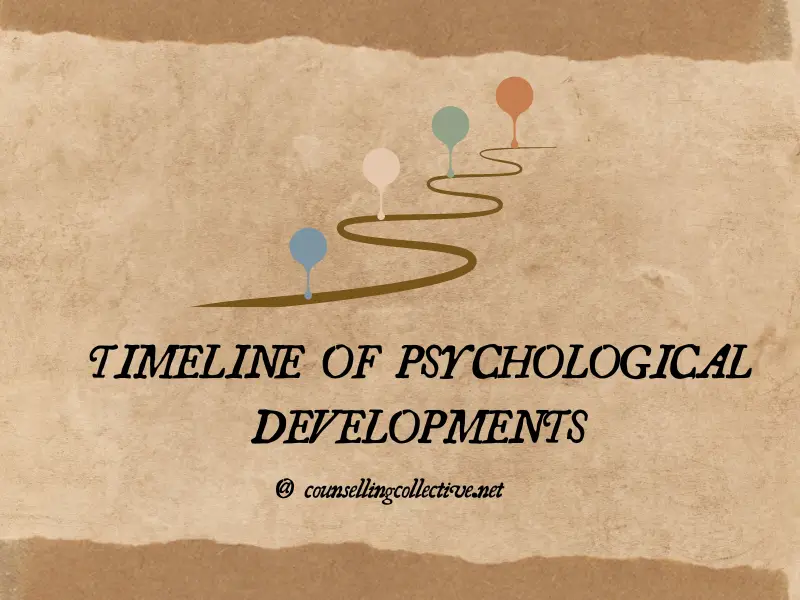
| Era | Highlights |
| Ancient Philosophical Roots (500 BCE – 300 CE) | Ancient Greek philosophers like Socrates, Plato, and Aristotle pondered questions of human nature, consciousness, and perception. Their theories laid the groundwork for the study of psychology, exploring concepts such as cognition, emotions, and the relationship between mind and body. |
| Birth of Modern Psychology (Late 19th Century) | 1879: Wilhelm Wundt established the first psychological laboratory at the University of Leipzig, marking the beginning of experimental psychology. 1885: G. Stanley Hall establishes the first psychology research laboratory in the United States at Johns Hopkins University. 1890: William James publishes “The Principles of Psychology,” which is considered one of the foundational texts of modern psychology. |
| Schools of Thought (Early 20th Century) | 1900s-1920s: Psychoanalysis developed by Sigmund Freud, focusing on the unconscious mind and the role of early childhood experiences. 1910s-1920s: Behaviorism led by John B. Watson and later B.F. Skinner, emphasizing observable behavior and conditioning. 1920s-1930s: Gestalt psychology, with Max Wertheimer, Wolfgang Köhler, and Kurt Koffka, emphasizes the importance of holistic perception and experience. |
| Cognitive Revolution and Humanistic Psychology (Mid 20th Century) | 1950s-1960s: Cognitive psychology emerges, focusing on mental processes such as memory, problem-solving, and language. 1950s-1960s: Abraham Maslow and Carl Rogers pioneer humanistic psychology, emphasizing personal growth, self-actualization, and subjective experience. |
| Behavioral and Cognitive Behavioral Therapies (1960s-1970s) | 1960s: Albert Ellis developed Rational Emotive Behavior Therapy (REBT), a precursor to Cognitive Behavioral Therapy (CBT). 1970s: Aaron Beck developed Cognitive Therapy, which later evolves into CBT, a widely used therapeutic approach. |
| Positive Psychology and Neuroscience ( 1980s-1990s) | 1998: Martin Seligman introduces the concept of positive psychology, focusing on well-being, strengths, and positive emotions. Late 20th century: Advances in neuroscience contribute to the understanding of brain functions and their relation to behavior and mental disorders. |
| Technology and Contemporary Approaches(21st Century) | 2000s: Rise of online therapy and digital interventions, expanding access to psychological support. 2010s: The field of neuropsychology continues to advance, revealing insights into brain-behavior relationships. 2020s: Increasing focus on cultural psychology, global mental health, and the integration of various psychological approaches. |
Development of Modern Psychology
The history of psychology is a captivating journey that unveils the evolution of our understanding of the human mind and behavior. Over the years, various schools of thought have emerged, each offering distinctive perspectives and contributing to the mosaic of psychological knowledge. In this section, we will get to know the foundational schools of thought that have shaped the trajectory of modern psychology.
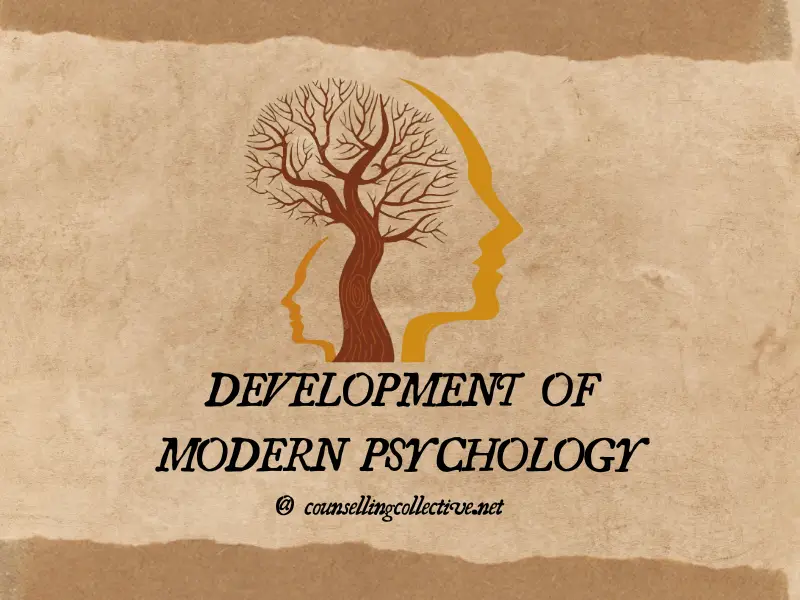
Foundational Schools of Thought
Foundational schools of thought in psychology refer to the early theoretical frameworks that laid the groundwork for the discipline. These include ;
- Structuralism
- Functionalism
- Behaviorism
- Gestalt psychology
Structuralism: Unveiling the Components of Consciousness
At the turn of the 20th century, Wilhelm Wundt ushered in the era of structuralism, an approach dedicated to dissecting the elemental components of conscious experience. Wundt’s Leipzig laboratory became the epicenter of this movement, where introspection—the process of self-observation and reporting—was employed to deconstruct mental processes.
- Structuralists sought to isolate and analyze the basic elements of thoughts, sensations, and emotions, aiming to construct a comprehensive framework for understanding the complexities of human consciousness.
- The works of Edward Titchener, a student of Wundt, further solidified the structuralist perspective. Titchener’s approach focused on identifying the building blocks of consciousness, often referred to as “sensations” and “images.” While structuralism waned in prominence over time, its legacy continues to influence the study of perception, memory, and thought processes.
Functionalism: Embracing the Functions of Behavior
In contrast to structuralism’s emphasis on the parts, functionalism directed its focus towards the purposes and adaptive functions of behavior.
- Proposed by the American psychologist William James, functionalism viewed consciousness as a dynamic mechanism that facilitates adaptation to the surroundings. James’s seminal publication, “The Principles of Psychology,” searched into the ways in which mental processes fulfill pragmatic functions in people’s everyday experiences.
- Functionalism presented a more comprehensive outlook on the mind, recognizing that human behavior isn’t a mere collection of disconnected components. Instead, it entails a fluid interaction between mental processes and the external environment.
- This perspective laid the groundwork for investigating cognitive functions, the process of learning, and the complex interconnectedness between individuals and their surroundings.
Behaviorism: Unraveling Observable Behavior
The rise of behaviorism in the early 20th century brought a paradigm shift in psychological inquiry. Rejecting introspection and the study of mental processes, behaviorists like John B. Watson advocated for the scientific study of observable behavior. Behaviorism posited that behavior is influenced by environmental stimuli, and responses can be shaped through conditioning.
- B.F. Skinner further developed this perspective with operant conditioning, demonstrating how reinforcement and punishment shape behavior.
- Behaviorism’s emphasis on empirical observation revolutionized the study of psychology. While criticized for its narrow focus, behaviorism laid the foundation for understanding learning, motivation, and the principles of behavior modification.
Gestalt Psychology: Perceiving the Whole
Amidst the dominance of structuralism and behaviorism, the gestalt psychology movement emerged, emphasizing the significance of studying perception and experience as holistic wholes.
- Max Wertheimer, Wolfgang Köhler, and Kurt Koffka led this approach, asserting that the mind organizes sensory information into meaningful patterns.
- Gestalt psychologists challenged the reductionist views of other schools, advocating for an understanding of perception that considers the interaction between elements.
- Their insights into visual and cognitive processes enriched both psychology and other disciplines. Gestalt psychology’s influence can be observed in contemporary studies of cognitive psychology, perception, and problem-solving.[5]
Key Figures and Their Contributions to the History of Psychology
The history of psychology is a complex mosaic formed through the ideas and influential contributions of many key figures who have profoundly influenced our comprehension of the human mind and behavior. From the establishment of the first psychological laboratory to the development of groundbreaking theories, these luminaries have left indelible marks on the field.
In this section, we embark on a journey through time to explore the pivotal contributions of;
- Wilhelm Wundt
- William James
- Sigmund Freud
- Ivan Pavlov
- B.F. Skinner
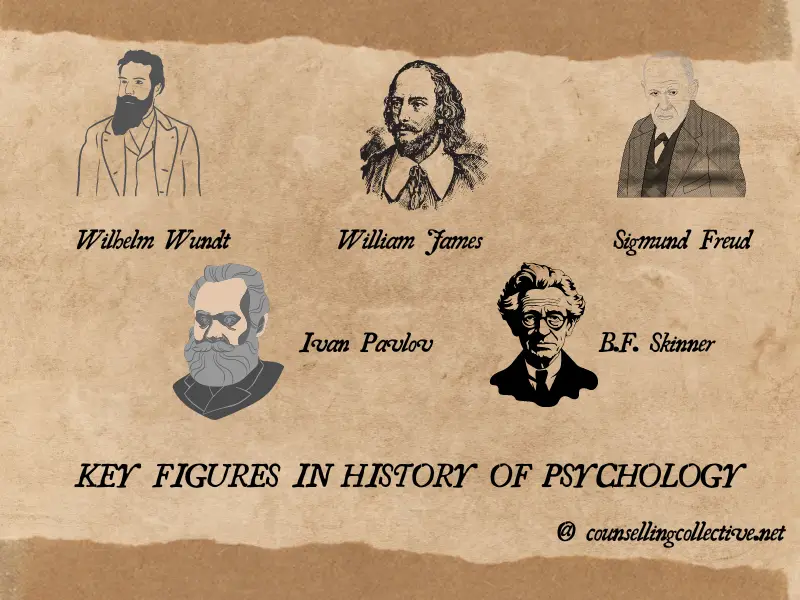
Wilhelm Wundt and the Establishment of the First Psychological Laboratory
Wilhelm Wundt, a German philosopher and psychologist, is often hailed as the pioneer of modern psychology. In 1879, he founded the first experimental psychology laboratory at the University of Leipzig, Germany. Wundt’s laboratory marked a turning point, emphasizing the importance of empirical research and systematic observation in studying mental processes.
- Wundt’s approach, known as structuralism, aimed to analyze the components of consciousness through introspection. His work laid the groundwork for understanding the elemental aspects of thoughts, sensations, and emotions.
- Wundt’s dedication to scientific inquiry set a precedent for the rigorous methodologies that would become integral to psychology’s development. [5]
William James and the Functionalist Perspective
- William James, an American philosopher and psychologist, offered an alternative perspective to the structuralist approach. His functionalist perspective, as outlined in his seminal work “The Principles of Psychology” (1890), shifted the focus from structure to the function of consciousness.
- James emphasized that the mind is a dynamic entity, constantly adapting to its environment. He explored topics such as consciousness, memory, and emotions from the standpoint of their practical utility in human life. James’s functionalism broadened the scope of psychology, paving the way for the exploration of cognitive processes and the intricate interplay between individuals and their surroundings. [6]
Sigmund Freud and the Psychoanalytic Approach
Sigmund Freud, an Austrian neurologist and the father of psychoanalysis, introduced a revolutionary approach to understanding the human mind.
- In the late, Freud proposed that unconscious desires, conflicts, and childhood experiences play a pivotal role in shaping human behavior. His psychoanalytic approach searched into the hidden recesses of the mind.
- Freud’s theories, including concepts like the id, ego, and superego, unveiled the complexities of the unconscious mind and laid the foundation for the field of clinical psychology. His exploration of dream analysis, defense mechanisms, and the influence of sexuality on human behavior transformed our understanding of the deeper motivations that drive human actions.[7]
Ivan Pavlov and Classical Conditioning
Russian physiologist Ivan Pavlov’s contributions to psychology centered around his research on classical conditioning. His experiments with dogs in the early 20th century demonstrated how behaviors could be conditioned through associations.
- Pavlov observed that animals could learn to anticipate specific events based on repeated pairings of stimuli.
- Pavlov’s work provided a critical foundation for behaviorism, a dominant school of thought in psychology. His research highlighted the significance of environmental stimuli in shaping behavior, leading to the development of classical conditioning principles that have applications in various domains, including learning, therapy, and even advertising.[8]
B.F. Skinner and Operant Conditioning
B.F. Skinner, an influential behaviorist, expanded our understanding of behavior through his research on operant conditioning. Unlike classical conditioning, which focuses on involuntary responses, operant conditioning centers on the consequences of voluntary actions. Skinner’s work introduced the concepts of reinforcement and punishment.
Skinner’s operant conditioning principles demonstrated how behavior could be modified and shaped through the use of positive or negative consequences. His research laid the foundation for behavior therapy approaches and emphasized the importance of external factors in influencing behavior.[9]
Timeline of Famous Psychologists:
This timeline provides a glimpse into the major milestones and influential figures in the history of psychology since the 18th century, showcasing the diverse and evolving nature of the field.
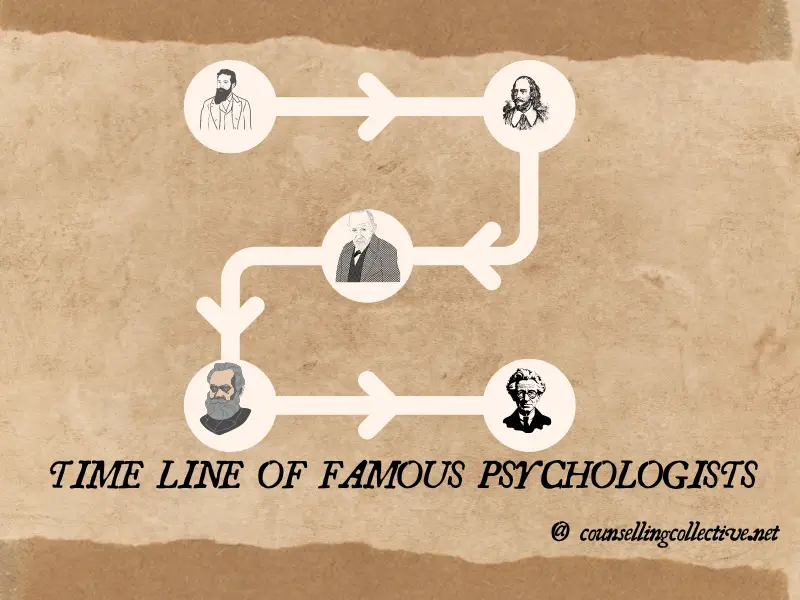
| Psychologist / Era | Highlights |
| Plato (387BC) | Plato suggested that the brain is the mechanism of mental processes |
| Aristotle (384-322 BCE) | Aristotle explored topics related to psychology, including memory, perception, and emotions. |
| Franz Mesmer (1774) | He introduces the concept of animal magnetism, which later influences the development of hypnosis and psychotherapy. |
| Philippe Pinel (1792) | His research advocates for more humane treatment of mentally ill patients, contributing to the field of psychiatry. |
| Wilhelm Griesinger (1838) | Wilhelm Griesinger establishes a link between mental disorders and brain pathology, laying the foundation for biological psychology. |
| Wilhelm Wundt (1879) | Wilhelm Wundt established the first psychology laboratory in Leipzig, Germany, marking the birth of experimental psychology. |
| Sigmund Freud (1856) | Freud was founder of psychoanalysis and influential figure in understanding the unconscious mind. |
| Carl Jung (1878) | Jung was known for his work on analytical psychology, archetypes, and the collective unconscious. |
| William James (1890) | He published ‘Principles of Psychology’, that later became the core of functionalism |
| Jean Piaget (1896) | Prominent developmental psychologist who studied cognitive development in children. |
| B.F. Skinner (1902) | Skinner was a behaviorist who developed principles of operant conditioning and emphasized the role of reinforcement. |
| Ivan Pavlov (1908) | Pavlov published the first studies on classical conditioning laying the foundation for behaviorism |
| Max Wertheimer (1912) | Wertheimer published research on the perception of movement, marking the beginnings of Gestalt Psychology. |
| John E. Watson (1913) | He published ‘Psychology as a Behaviorist Views It’ marking the beginnings of Behavioral Psychology. |
| Carl Jung (1920) | Carl Jung introduces analytical psychology, emphasizing the importance of the collective unconscious and archetypes. |
| Abraham Maslow (1915) | Maslow was known for his humanistic approach and the development of the hierarchy of needs. |
| Wolfgang Kohler (1919) | Kohler published ‘The mentality of apes’, pioneering the field of gestalt psychology. |
| Albert Bandura (1927) | Bandura was renowned for his social learning theory, which emphasizes the role of observation and modeling in behavior. |
| Anna Freud (1927) | She progressed her father’s (Sigmund Freud) work towards treatment of children. |
| Carl Rogers (1942) | He published ‘Counseling and Psychotherapy’ that focuses on a non-judgmental approach to therapy. |
| Erik Erikson (1950) | His work revolves around stages of development and personality development across lifespan. |
| Leon Festinger (1957) | Leon Festinger introduces cognitive dissonance theory, marking the beginning of cognitive psychology. |
| Stanley Milgram (1961) | Stanley Milgram conducted his famous obedience experiments, shedding light on the power of situational influences on behavior. |
| Martin Seligman (1967) | Martin Seligman pioneers the field of positive psychology, focusing on well-being and human strengths. |
| Albert Bandura (1970) | Albert Bandura introduces social cognitive theory, emphasizing the role of observation and modeling in learning. |
| Daniel Kahneman (2000) | Daniel Kahneman receives the Nobel Prize in Economics for his work on behavioral economics, bridging psychology and economics. |
| Angela Duckworth (2013) | Angela Duckworth introduces the concept of grit, exploring the role of perseverance and passion in achieving long-term goals. |
Expansion and Diversification of Psychology
The history of psychology is a fascinating story that unfolds over centuries, encompassing various theories and evolving into a diverse field.
In this article, we take a comprehensive journey through psychology’s growth and diversification, exploring its various branches and their impact on our understanding of the human psyche.
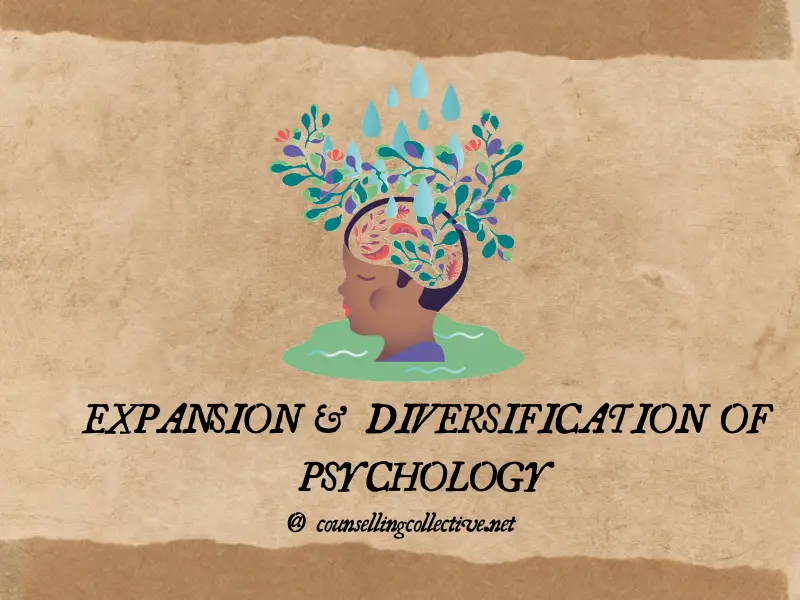
| Branches of Psychology | Definition |
| Humanistic psychology | This school of thought emphasizes the importance of human free will and personal growth. |
| Cognitive psychology | This school of thought focuses on the study of mental processes, such as attention, memory, and thinking. |
| Developmental psychology | This school of thought studies the changes that occur in human development from conception to death. |
| Social psychology | This school of thought studies the influence of social factors on individual behavior. |
| Biological and evolutionary psychology | These schools of thought focus on the biological and evolutionary bases of behavior. |
Humanistic Psychology: Embracing the Essence of Humanity
In the mid-20th century, a new movement emerged within psychology, focusing on the inherent dignity and potential of human beings. Humanistic psychology, led by luminaries such as Abraham Maslow and Carl Rogers, sought to counterbalance the prevailing behaviorist and psychoanalytic approaches by accentuating the positive aspects of human experience.
Humanistic psychology views individuals as unique beings with innate capacities for self-actualization and personal growth. It emphasizes subjective these ;
- Experiences.
- Self-awareness.
- Importance of individuals’ conscious perceptions of their own lives.
By prioritizing human values and aspirations, humanistic psychology encourages a holistic understanding of human nature that extends beyond mere scientific analysis. [10]
Cognitive Psychology: Unraveling Mental Processes
The cognitive revolution, which gained momentum in the 1950s, brought about a paradigm shift in psychology. Cognitive psychology shifted the focus from observable behavior to the exploration of mental processes such as perception, memory, reasoning, and problem-solving. Figures like Ulric Neisser and George Miller played key roles in this transition.
Cognitive psychology introduced the idea that the mind processes information similarly to a computer, sparking the development of cognitive models and theories. This approach has had a profound impact on fields ranging from education to artificial intelligence, as researchers seek to understand how the mind processes and organizes information.[11][13]
Developmental Psychology: Tracing Lifespan Changes
Developmental psychology examines the changes that occur in individuals over the course of their lives. Pioneers such as Jean Piaget and Erik Erikson laid the foundation for understanding cognitive, emotional, and social development from infancy to old age. Piaget’s stages of cognitive development and Erikson’s psychosocial stages have become influential frameworks in the field.
Developmental psychology illuminates the factors that shape individuals at different life stages, from the acquisition of language and social skills in childhood to the challenges of aging. By studying these developmental approaches, researchers and practitioners gain insights into how experiences and environments impact human growth and maturation.[12]
Social Psychology: Probing Group Dynamics and Behavior
Social psychology explores how individuals are influenced by their interactions with others and the larger social context.
Figures like Kurt Lewin and Solomon Asch laid the groundwork for understanding group dynamics, conformity, and social influence. This branch investigates topics such as prejudice, attitudes, and interpersonal relationships.
Social psychology sheds light on how individuals navigate the complexities of social interactions, revealing the subtle ways in which external factors impact behavior, beliefs, and perceptions. The insights gained from social psychology have implications for fields including marketing, communication, and conflict resolution.
Biological and Evolutionary Psychology: Exploring the Brain-Mind Connection
Advances in neuroscience have led to the emergence of biological and evolutionary psychology, fields that searched into the intricate relationship between biology and behavior. These branches examine the physiological processes underlying psychological phenomena, as well as how evolutionary forces have shaped human cognition and behavior.
Biological psychology investigates the neural mechanisms responsible for emotions, motivation, and psychological disorders.
Evolutionary psychology, on the other hand, searches into how adaptations that were advantageous for our ancestors continue to influence our behavior today. These fields offer insights into the biological foundations of mental processes and behaviors, bridging the gap between brain and mind.[11]
Contributions of Psychology in Applied Settings
Psychology plays a crucial role in applied settings, where its contributions are diverse and impactful.
Psychology has contributed in every aspect of present day life, be it personal or professional, individual or social. This section will list down the important areas of our lives which have been revolutionized by advances in the field of psychology.
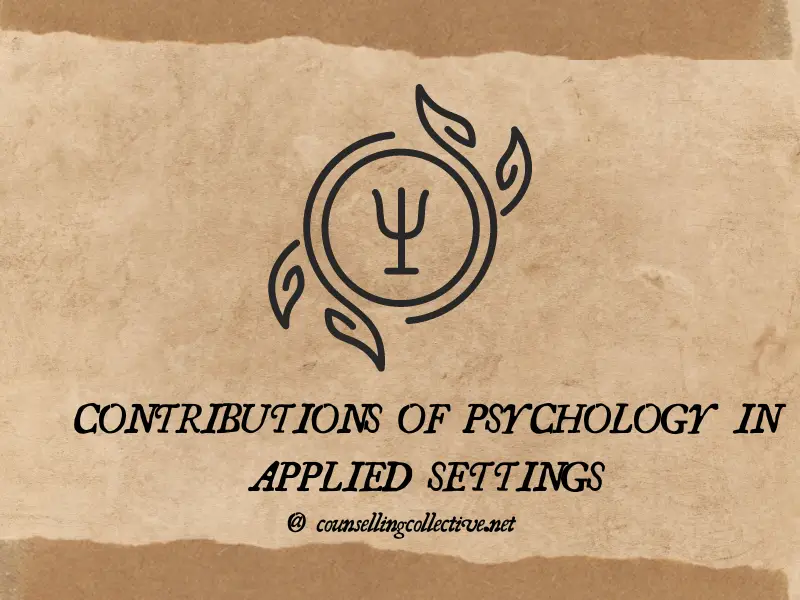
Here are some key areas where psychology has made significant contributions:
- Improving Lives; Psychology goes beyond theory, with real-world applications that touch various aspects of human existence. From bolstering mental health to optimizing workplaces and aiding legal processes, applied psychology has a profound impact. In this concise version, we explore its key branches and contributions.
- Clinical Psychology: Guiding Mental Health Clinical psychology tackles mental health challenges. It combines research and therapy to diagnose, treat, and prevent disorders like depression and anxiety.
- Counseling Psychology: Fostering Growth Counseling psychology supports personal development and emotional well-being. It helps individuals navigate life’s challenges, improve self-awareness, and build resilience.
- Educational Psychology: Enhancing Learning Educational psychology optimizes teaching and learning. It considers factors like cognitive development and motivation, tailoring approaches to diverse learning styles.
- Industrial and Organizational Psychology: Shaping Workplaces I/O psychology focuses on workplace dynamics. It enhances employee satisfaction, productivity, and organizational effectiveness.
- Forensic Psychology: Bridging Law and Psychology Forensic psychology blends psychology with the legal system. It evaluates factors like criminal intent and risk assessment, contributing to fair and informed legal decisions.
These branches of applied psychology work together to improve lives, fostering mental well-being, personal growth, effective learning, positive workplaces, and justice within society.
Contemporary Perspectives in Psychology
Contemporary perspectives in psychology encompass a range of approaches that reflect the evolving nature of the field. These include:
- Positive Psychology: Focuses on positive emotions and well-being, aiming to enhance happiness, resilience, and optimism. It promotes a fulfilling life.
- Cross-cultural Psychology: Examines how culture influences human thoughts, emotions, and behavior. It’s crucial for understanding diversity and developing universal interventions.
- Neuroscience and Neuropsychology: Studies the brain and nervous system, providing insights into the biological basis of behavior and mental disorders. It explores areas like emotion processing and memory.
- Evolutionary Psychology: Investigates how natural selection shapes human behavior. It helps us understand why we have evolved certain traits and behaviors.
- Eclectic Approaches: Blend different psychological schools to address individual needs, particularly in clinical psychology. They aim to help clients achieve their specific goals.
These contemporary perspectives in psychology offer diverse lenses through which we explore and understand the complexities of human behavior and mental processes. [14]
Recent Trends and Future Directions
In this section we will discuss recent trends in psychology including interdisciplinary research, technology integration, and a focus on diversity and equity.
Future directions involve AI and data science, addressing the impact of technology on mental health, and emphasizing cultural diversity and ethics in research and practice.
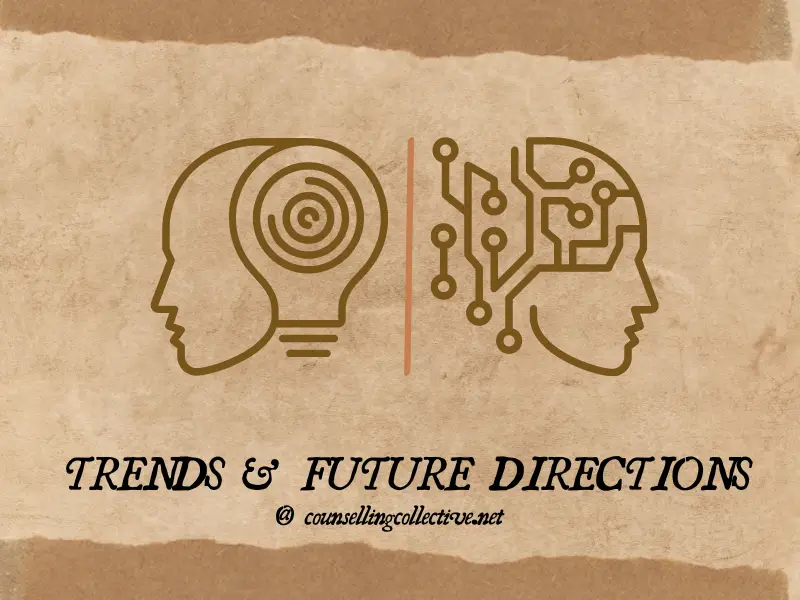
Integration of technology in psychology
Technology is increasingly being used in psychology, for research, assessment, and intervention.
For example, technology is being used to develop virtual reality therapy for anxiety disorders, and to collect data on people’s behavior and mental states. The integration of technology in psychology is still in its early stages, but it has the potential to revolutionize the way that psychology is practiced.
Advancements in neuroscience research
Neuroscience research is advancing at a rapid pace, and this is having a major impact on our understanding of psychology.
For example, recent research has shown that the brain is constantly changing and adapting, which has implications for our understanding of learning, memory, and development. Advances in neuroscience research are also leading to the development of new treatments for psychological disorders.
Emphasis on multicultural perspectives
There is a growing emphasis on multicultural perspectives in psychology. This is due to the increasing diversity of the population, and the recognition that culture plays a significant role in shaping human behavior.
Within the realm of psychology, there are a multitude of emerging fields that have garnered considerable attention in recent times. Notable among these domains are positive psychology, neuroeconomics, and computational psychology.
These cutting-edge disciplines employ innovative techniques and theories to comprehensively investigate various aspects of the human mind, leading to novel and profound understandings of human behavior.
By harnessing these methodologies, researchers are able to shed light on previously unexplored dimensions of the intricate workings of the human psyche.
Interdisciplinary approaches, such as the study of the brain-body connection, are also becoming increasingly common.
Conclusion
In the conclusion, the history of psychology is a journey that spans centuries, reflecting the evolution of human thought, scientific inquiry, and our understanding of the complexities of the human mind and behavior.
From its early philosophical roots to the modern multidisciplinary field it has become, psychology’s growth is marked by a school of thought, and key figures who have left an indelible mark on its directions.
The foundational schools of thought, including structuralism, functionalism, behaviorism, and gestalt psychology, have paved the way for the development of modern psychology. Each perspective offered a unique lens through which to explore the intricate workings of the human mind. Structuralism’s focus on elemental components, functionalism’s emphasis on purpose, behaviorism’s study of observable actions, and gestalt psychology’s holistic perception all contribute to the diverse array of tools available to contemporary psychologists.
The contributions of key figures like Wilhelm Wundt, William James, Sigmund Freud, Ivan Pavlov, and B.F. Skinner has enriched psychology’s tapestry. From establishing the first psychological laboratory to unveiling the depths of the unconscious, their work has laid the foundation for various psychological approaches that continue to shape research, therapeutic interventions, and our understanding of human behavior.
As psychology expanded and diversified, branches like humanistic psychology, cognitive psychology, developmental psychology, social psychology, biological and evolutionary psychology, and more emerged. Each branch offered a specialized perspective that addressed specific facets of the human experience, enriching our understanding of topics ranging from personal growth and cognition to social dynamics and the biological basis of behavior.
Recent trends and future directions demonstrate psychology’s adaptability to societal shifts and technological advancements. The integration of technology, advancements in neuroscience research, emphasis on multicultural perspectives, and the emergence of interdisciplinary fields exemplify psychology’s responsiveness to the ever-evolving landscape of human inquiry. These trends open new avenues for research, intervention, and our collective exploration of the human mind and behavior.
References:
- Importance and advantages of studying history and systems of psychology. Thestoryofpsychology. 2016.
- Mesopotamia: The British Museum. (n.d.). Ancient Mesopotamia: This History, Our History.
- Kamil, S. (2019). Ancient Egyptian Psychiatry. World Journal of Psychiatry, 9(1), 5-12.
- Goodwin, C. J. (2017). A history of modern psychology (5th ed.). John Wiley & Sons. Amazon
- Wundt, W. (1897). Outlines of psychology. Wilhelm Engelmann.
- James, W. (1890). The principles of psychology. Henry Holt and Company.
- Freud, S. (1899). The interpretation of dreams. Basic Books. Amazon
- Pavlov, I. P. (1927). Conditioned reflexes. Dover Publications. Amazon
- Skinner, B. F. (1938). The behavior of organisms. Appleton-Century. Amazon
- Wertheimer, M. (1923). Untersuchungen zur Lehre von der Gestalt, II. Psychologische Forschung, 4(1), 301-350.
- Aronson, E., Wilson, T. D., & Akert, R. M. (2019). Social psychology (10th ed.). Pearson. Amazon
- Erikson, E. H. (1963). Childhood and society (2nd ed.). W. W. Norton & Company. Amazon
- Neisser, U. (1967). Cognitive psychology. Appleton-Century-Crofts. Amazon
- Rogers, C. R. (1951). Client-centered therapy: Its current practice, implications and theory. Houghton Mifflin. Amazon
